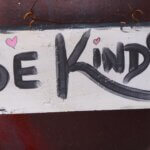Guest post by Rev. Louis Lotz
I used to wonder what I would be like when I got old. Now I wonder what I was like when I was young. You see a photograph of yourself as a child and you think you remember that day. But you don’t, really. The photograph creates the memory. Or parents tell you the story of how as a child you did something cute. As you listen to the story you see it in your mind, so to speak. You watch it happen. You watch the story again and again until gradually it becomes real. It becomes a memory. I figure half the childhood memories in my head are manufactured.
One memory I’m pretty sure is real – no adult told me it happened, and there were no photographs taken – is of an incident that occurred on my first day in kindergarten. My teacher had a gentle face, gray hair going on silver, and a luminous smile. She wore a silk scarf the color of a peach, knotted at her throat. She greeted me sweetly and asked me what my name was. I told her. Then she asked: “Where do you live?”
I didn’t know. I knew I lived in a white house. I knew how to walk there, what streets to take. But I didn’t know where it was. I stammered. Tears came to my eyes. “I don’t know where I live,” I said. There was a glissando of giggles from the other children. Then, deliverance. A girl in a pink dress – her name was Nancy Tremper– whispered to me: “She means, what is your address?” I knew my address. My parents had me memorize it, along with our telephone number, in the days prior to school. I blurted, “135 Birchwood Terrace!” as if shouting into the ear trumpet of a deaf aunt.
The teacher wrote my name and address in a brown ledger book, patted my hand softly, and said, “Good.” Nancy Tremper smiled.
We long to do big things in life, but somehow it is the small stuff that people remember.
Rev. Louis Lotz
Our lives are sustained and sweetened by the smallest, simplest acts of human kindness. We long to do big things in life, but somehow it is the small stuff that people remember. A minister friend accepted a call to serve another church. Before leaving his old parish there was a reception in his honor, and the congregation presented to him a thick book filled with remembrances of his years of service. Apparently, every member of the congregation had contributed a page. “What struck me,” he said, “is that almost every remembrance concerned some small, inconsequential thing that I’d long since forgotten – a prayer at the hospital, a phone call on someone’s anniversary, that kind of thing. I thought I’d accomplished some big things in my tenure at that church, but none of them were mentioned.”
Small stuff makes such a big difference. The tragedy of life, it seems to me, is that we fail to do something small and simple that we can do because we are waiting to do something large and heroic that we cannot do. Think small. The world is a big place, and there is much wrong with it, big problems you cannot fix. You cannot help everybody.
But you can help somebody. You cannot erase world hunger, but you can serve at the soup kitchen. You cannot solve inner-city gang problems, but you can tutor one child. You cannot cure cancer, but you can send flowers to a friend undergoing chemotherapy. The smallest good deed is worth more than the grandest good intention.
Who knows, perhaps a half-century from now someone will look back and savor your small gesture of kindness, the one you’d long since forgotten, and bless you for it. Little did you know how God used you in that small, simple act.
Good night, Nancy Tremper, wherever you are.
The Rev Louis Lotz, D. Min, is a retired pastoral leader of Central Reformed Church in Grand Rapids, Michigan.
Reprinted from The Church Herald, May 2007 edition, with permission of the author









0 Comments